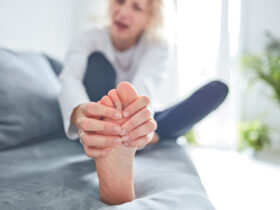By Hoglund Family Hearing and Audiology Services
Hoglund Family Hearing and Audiology Center is proud to feature LEE HEALTH’S RENOWNED BALANCE EXPERT Nathalie Grondin during this Month’s “Lunch and Learn” lecture series. This Seminar will answer all your questions concerning new treatments for Hearing Loss, Balance Issues, and Reducing Risks of Falls …you will be amazed to see how closely these conditions are all tied together!
The control of balance in humans is quite complex and involves coordination of several sensory systems. These are the musculoskeletal system (proprioception), vision and the balance organs in the internal ears. These systems are linked to a center at the base of the brain – the vestibular nucleus. This, in turn, sends information to, and also receives input from your brain. Many factors can cause problems in each of these areas.
Most balance problems are caused by disorders of the balance organs or the pathways of balance in the brain. Damage to the balance organs could take one of many forms., People often have severe nausea and may even vomit. There is also a sensation of spinning to the same side. This may result in falls to the same side.
Another type of disorder occurs when there is a fluctuation of function in the balance organs. In this condition, which is known as Meniere’s Disease, the hearing organ is also affected. Hence attacks of dizziness are often accompanied by nausea, vomiting, hearing loss and tinnitus. The attacks, which may last up to 24 hours, are sometimes so severe that people may need admission to a hospital.
In other cases, dizziness could be provoked by head movements. Symptoms commonly occur during bending, looking up, extending the head or turning in bed. This condition occurs due to misplacement of crystals in the balance organ. The dizziness usually subsides after a few seconds. This is known as Benign Paroxysmal Positional Vertigo (BPPV). This disorder is quite common. It usually affects one balance organ; rarely both organs could be affected.
In most cases, there will be a gradual recovery of balance function. This process may be prolonged if there is ongoing anxiety or a lack of mobility. Simple provocation exercises are the best treatment for those with disorders of the balance organs and balance pathways. Relaxation Therapy could be helpful in relieving anxiety. This may be practiced as a part of techniques such as yoga, Pilates or Tai Chi. The Seminar will cover these topics in much greater depth.
UNTREATED HEARING LOSS CAN
DRAMATICALLY INREASE FALL RISK!
Hearing occurs in the brain. The pathway to signal transmission and comprehension is quite complex. Hearing loss due to injury, illness, excessive sound, and aging affects our brain health and puts us at increased risk of cognitive decline. It also affects our physical health with an increased risk of falls and our mental health with an increased risk of depression and social isolation.
Maybe you’ve tripped over a rock or slipped on a wet surface. We’ve all fallen, but did you know that now hearing loss may be what is causing those falls? By discovering the link between hearing loss and falls, researchers could develop new ways to prevent falls, especially in the elderly, as well as the injuries that are caused by falling.
Frank Lin, M.D., Ph.D., an assistant professor at the Johns Hopkins University School of Medicine, found that people with a 25-decibel hearing loss, classified as mild, were nearly three times more likely to have a history of falling. Every additional 10-decibels of hearing loss increased the chances of falling by 1.4-fold. He believes that the link is when people who can’t hear well have a limited awareness of their overall environment, accounting for more tripping and falling. Another reason hearing loss might increase the risk of falls, Lin adds, is cognitive load, in which the brain is overwhelmed with demands on its limited resources. “Gait and balance are things most people take for granted, but they are actually very cognitively demanding,” Lin was quoted as saying. “If hearing loss imposes a cognitive load, there may be fewer cognitive resources to help with maintaining balance and gait.” Treating the Hearing Problems may therefore reduce fall risk!
John Hoglund, BC-HIS, ACA will cover topics include breakthroughs in the treatment of Nerve Deafness, and advancements in the treatment of Tinnitus or “Ringing Ears”! John will explain the comorbidities associated with hearing loss, including the risk of falls and balance problems, Learn EXCITING NEW TREATMENTS that have brought dramatic relief to the majority of Tinnitus Sufferers.
If you have experienced Dizziness, Vertigo, Communication Problems, Balance Problems, or if you’ve been diagnosed with Meniere’s Syndrome, DON’T MISS THIS LECTURE! Crowds will be limited, and please bring a mask to keep a SAFE environment for learning! PLEASE RSVP as soon as possible to learn more about this exciting new healthcare research!
Hoglund Family Hearing And Audiology Center
Fifteen 8th Street, Suite B (Next to Royal Scoop Ice Cream)
Bonita Springs, FL 31434
Southwest Florida Tinnitus And Hearing Center
10020 Coconut Rd. Ste.120 (Next to LabCorp)
Estero, FL 34135
AUDIOLOGY CENTERS OF HOGLUND FAMILY HEARING
13710 Metropolis Ave.Suite 101
(One block west of Gulf Coast Hospital)
Fort Myers, FL 33912
Hoglund Family Hearing And Audiology Center
1003 Del Prado Blvd South, Unit 204
(Towers Professional Building, Next to Downtowner Car Wash)
Cape Coral, FL 33990









